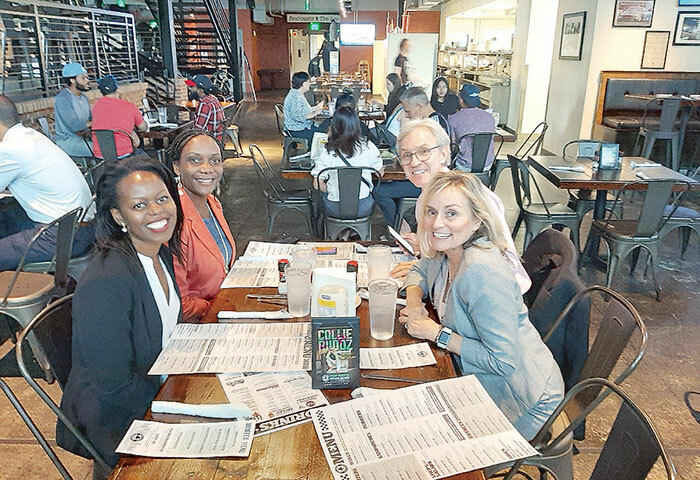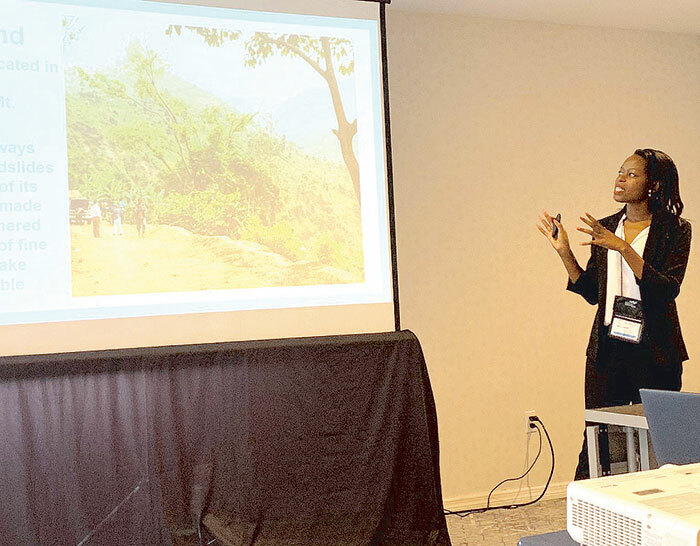COVID-19 Stigma: A tale of a returnee academic
Jun 01, 2020
I called the gentleman at the Ministry of Health again; he was surprised that no one had followed up. He told me he would get back to me, but he did not.

COVID-19 STIGMATISATION EXPERIENCES
Angela Napakol, a senior lecturer and head of the communication department, Faculty of Journalism, Media and Communication at Uganda Christian University, returned to Uganda on March 15, after spending time in Greece for a European Union student exchange programme and later in Florida, US for a conference.
While there, she developed COVID-19 symptoms and this saw her go through a nightmare of stigmatisation. She narrates her ordeal.
I watched a video circulating online about a truck driver who had stopped by a roadside, perhaps to stock up on some supplies from the shops across the road. Sadly, a man is heard shouting in Kiswahili not to go anywhere near the shops.
The poor truck driver stood, seemingly perplexed, but the shouting man was relentless. Finally, he went back to his vehicle and drove away.
I can only imagine what he felt. Was he less human because truck drivers have become the face of COVID-19 in Uganda? Watching that video reminded me of my own experience.
I returned home on March 15. I was away in Greece for an Erasmus+ exchange (a European Union student exchange programme) and then later in Florida, US for a conference.
Four days into my visit, I came down with one of the worst flus I have suffered in a long time. I had meetings lined up that day, but I informed my host about my sickness because I did not want to infect others.
My host immediately went into panic mode and I could hear it in her voice. She told me not to get out of my room until she got authorities at the university to handle the situation. A few minutes later, she called and informed me that I was to get communication from the university soon with instructions on how to get to the hospital. Nothing came until about 1:00pm or 2:00pm, when I received an email with links to hospitals in Athens that tested COVID-19 suspect cases.
I was four days in Greece, my first time ever in Greece, but I was expected to find my way to hospital. I realised people were panicking so I was left to fend for myself. The website was in Greek and I failed to get the translated version.
So I stayed in the room without anything to eat because it was my responsibility not to make others sick.
 Nakapol holding a discussion with colleagues in Florida, US.
Nakapol holding a discussion with colleagues in Florida, US.
Finally, at about 4:30pm, I got a call asking if I had accessed the links and informed the hospital(s) of my condition. Of course, I relayed my frustrations of the failed translation attempts. The poor girl at the end of the phone realised what had happened and offered to order a cab for me. As soon as I got into the cab, I think the cab driver was told I was a COVID-19 suspect, and he grabbed all the scarfs in his car to cover himself, visibly irritated. He drove so fast, and in silence, until we got to hospital. His only word to me was, "Here" at the front of the hospital and sped off shortly after I alighted.
I got to the reception and was told that the hospital dealt with internal medicine and was unable to test for COVID-19. I was directed to another hospital about a kilometre away.
I walked to the next hospital and by the time I reached, every joint in my body ached. I was shivering, my eyes were teary and my head was pounding. I started believing that I actually had COVID-19.
Surprisingly, after listening to me, the man at the reception told me that I was not from a high-risk country and could not be tested.
Besides, he said my symptoms are not typical of COVID-19.
I had gone through a lot that day. I had not eaten the whole day and my body ached.
Needless to say, I felt so low and I believed that I had COVID-19, so I bargained for the test. I explained that though I came from a lowrisk country; I had gone through United Arab Emirates and even spent a night at a hotel there. However, my pleas fell on deaf ears and I was chased from the hospital.
Interestingly, I felt much better the following day and was fine by the time I left Greece for the US. And when I got to Entebbe airport, I was alright — or so I thought. I was told at the airport about self-quarantine and that I would be monitored, which was fine because I was glad to be home, locked up or not.
A few days into self-quarantine, I started sneezing, my chest hurt, my throat felt like a swelling was moving along it. I was scared.
 Nakapol making a presentation at the ICRCR.
Nakapol making a presentation at the ICRCR.
I called the Ministry of Health helplines, but could not get through for two days.
Finally, I called a gentleman, who had contacted me while I was still at the airport. He had requested for some details from me and I ended up saving his number. He picked up and promised to follow up once he got to his office, but I did not hear from him.
In the meantime, I was taking every concoction there was out there.
I told a doctor about my condition over the phone and he prescribed some medicines. These worked to relieve the chest while everything else remained the same. At the end of the dose, however, the pain came back reloaded; no one was more convinced than me that I had COVID-19. I called the gentleman at the Ministry of Health again; he was surprised that no one had followed up. He told me he would get back to me, but he did not. I figured that he might not have been on the surveillance team so his reach was limited. I gave up on the ministry.
I read everything I could find about COVID-19 and listened to people's stories, especially the survivors. I took concoctions and all medications prescribed for me. One of my friends has a doctor friend who would attend to me on phone and prescribe medication.
He suspected inflamed tonsils, among many things.
I took the medicine for tonsillitis and I felt some relief, although I still struggled. My breathing became clear, but the air hurt when it got down my lungs. And mentally, I was a mess. I talked myself out of panic attacks to remain calm: I had to learn how to survive.
I finally heard from a Kampala Capital City Authority official, who told me he was instructed to follow me up. When I told him I lived in Seeta, he told me I was under Mukono, so he could not help me, but gave me contact details for the district health officer (DHO) for Mukono. I called the DHO right away and he promised to send a team the next day.
I was excited that someone would finally look into my situation, but none came for two days. I called again and he apologised, promising that a team would be sent, but none was.
I continued with my concoctions, taking everything people recommended. Everyday presented something different until one night; I woke up with a high fever and had difficulty in breathing for the first time. I was wheezing terribly and my chest hurt when I inhaled.
That morning I took matters into my own hands. I went to the LC1 office and got a letter so that I could get permission to see a doctor.
Friends who were doctors and nurses told me it could be ulcers, but none of the prescribed medicines worked.
I got the letter, but I could only drive towards Mukono, and I needed a form from the resident district commissioner's office to travel to Kampala.
I drove to Mukono, parked by the roadside and called the DHO, who had forgotten about me, so I had to reintroduce myself. He told me he was swamped, but decided to hand me over to another official called Dr Mulindwa. Dr Mulindwa is a good and caring man, who listened to me without judgement and thought I should do an X-ray to determine the cause of the problem.
He too did not think it was COVID-19. He asked me to drive to the Church of Uganda hospital in Mukono. Upon arrival, he told me he was on his way to the hospital, but in the meantime, asked me to give the phone to one of the radiologists so he could explain the tests he needed done.
I found it strange that none of the hospital staff had a mask on — not the askari at the entrance, nurses, receptionist or the radiologist that I later spoke to. Anyway, after talking to Dr Mulindwa, the radiologist was angry. He asked for my details so angrily that I told him I merely followed orders and that he should take it up with Dr Mulindwa.
Dr Mulindwa arrived and soon realised that I was denied the X-ray services. I had been ordered to sit in a corner at the reception, which I obediently did. Dr Mulindwa contacted the surveillance team to take me to Naguru. As we waited, he went into the compound to make some phone calls as I scrolled through my phone in my corner.
From nowhere, I heard a roar and I turned to see a man shouting at me. "You, you, you, you! Yes, you. Get out of here! We do not want you here. Get out!"
I could not believe it, so I looked at him. He spoke through a window from one of the offices with some nurses hovering around him. He said: "How dare you come here? Yes, you. We have been reliably informed that you are in quarantine."
I was way past my quarantine days by then.
Naturally, people gathered and he shouted even more, instructing everyone in the lower area of the reception to get away from there.
I tried to open up my mouth to explain, but he became wild, calling me a young girl who is naïve. The shouting was accompanied by gestures and jeering. It was disgraceful and I felt horrible. It was happening again just like in Greece, where I was diagnosed without testing.
According to this man, I had COVID-19 and I ceased to be human. These experiences make me relate to the truck driver in the video and others who have been treated the same. We know that generally people can be mean and discriminative out of fear. I somewhat understand their reaction, but they can also handle the situation differently, better.
Although the Greece experience was not as grave as the Church of Uganda hospital or that of the truck driver in the video, there are subsequent emotional and mental health concerns victims of stigma suffer.
Ministry of Health can put in place guidelines for awareness, even for non-COVID-19 testing centres just in case there are more cases like mine.
I know some of you will say I should not have gone to that hospital or the truck driver should not have got out of his truck — but what if he needed something? What if he was in pain?
There are so many what ifs that should remind us that humanity should come first even in the face of fear. Besides, any of us could be in such a situation too.
And thankfully, I later tested negative for COVID-19.
